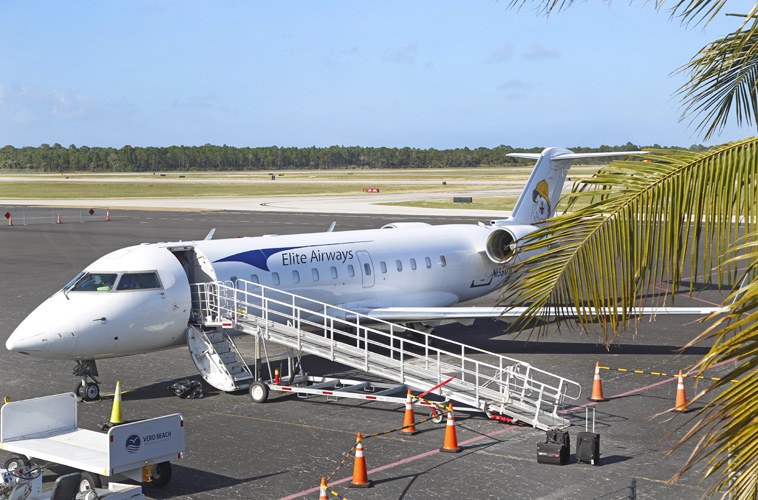
Elite Airways may end up a victim of its own success after the Vero Beach Airport Commission voted in favor of terminating the airline’s lease at Vero Beach Regional Airport to keep the city from losing up to a $1 million a year in state grants.
The City Council, which will make the final decision, is expected to take up the issue at its Jan. 21 meeting.
Elite Airways, which flies small Bombardier jets carrying 50 or 70 passengers back and forth between Vero Beach and Newark, N.J., as well as other destinations, has been a big hit in Vero.
Since it launched service here in 2015, beachside residents with summer homes in the New York area have raved about the convenience of the flights – with free parking, quick boarding and the airport just minutes from the island – and Elite has said that Vero is its best market.
Passenger numbers – and airline revenue – steadily increased from year to year and in 2018 the company flew 11,084 passengers, according to city documents.
It was the first time Elite had more than 10,000 passengers flying out of Vero in a single year and that is where the company’s current problem began.
The city was notified by the Florida Department of Transportation in December that the airport will be reclassified from a general aviation airport – which primarily serves small private planes – to a commercial airport effective in July because of the 10,000-passenger number.
If it goes into effect, the new classification would cost the city as much as $1 million per year in lost state grant revenue for airport projects included in the municipality’s five-year plan, City Manager Monte Falls said.
When an airport is designated as general aviation, the state typically covers 80 percent of the cost for large projects, while the city is responsible for 20 percent. Under the new designation, the cost split would be 50/50.
The new designation could deplete the airport’s current fund balance of $3.5 million in a few years, city officials said. Elite would need to handle 200,000 departing passengers a year to make up for the shortfall, according to Falls.
“It’s really a tough situation that we’re in and it’s not an Elite Airways problem,” Falls said. “Elite is just a commercial carrier that we happen to have and that’s a side issue. The issue we have is that we’ve pushed up into the commercial airline category.”
Although it’s estimated commercial service brought $8.3 million in economic benefit to the area, the Airport Commission saw no upside in keeping Elite and also advised the City Council not to find another airline to replace it, because of the financial risk any commercial airline could impose.
“Unfortunately, I just don’t see how the present situation can sustain itself,” Airport Commission Vice Chairman Louis Vocelle Jr. said. “Any future operations by Elite with 10,000 enplanements is an economic detriment to the city and to the airport.”
The Airport Commission voted unanimously to recommend terminating Elite’s contract to operate at the airport.
The advisory board’s recommendation comes just days after Elite agreed to a new lease agreement that ups the airline’s annual license fee from $8,400 a year to $20,625 and imposes an additional $18,000 annual rent charge for ticket-counter space – rate hikes Elite expected and had no objections to, according to city documents and city officials.
The fee increases were written into the new agreement because of low fees Elite was charged as a startup incentive, city documents state. The previous lease agreement with the airline expired on Nov. 30 and Elite is currently operating with a month-to-month lease agreement.
The popular carrier offers nonstop flights to and from Newark and Portland, Maine, during the winter, according to the city’s website. Elite has offered seasonal flights to Asheville, North Carolina, and limited winter holiday flights to White Plains, New York. It also tried a Vero to Naples route that was not successful.



